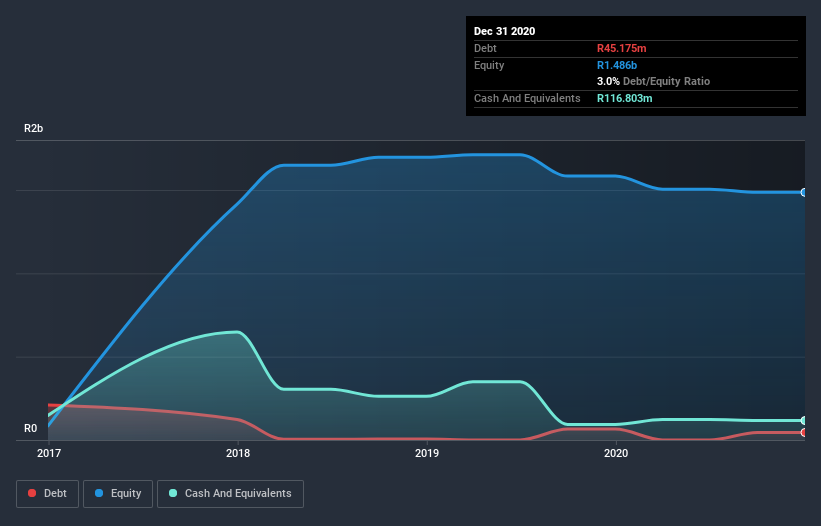- South Africa
- /
- Consumer Services
- /
- JSE:SDO
These 4 Measures Indicate That Stadio Holdings (JSE:SDO) Is Using Debt Reasonably Well
David Iben put it well when he said, 'Volatility is not a risk we care about. What we care about is avoiding the permanent loss of capital.' It's only natural to consider a company's balance sheet when you examine how risky it is, since debt is often involved when a business collapses. We can see that Stadio Holdings Limited (JSE:SDO) does use debt in its business. But is this debt a concern to shareholders?
What Risk Does Debt Bring?
Debt assists a business until the business has trouble paying it off, either with new capital or with free cash flow. Part and parcel of capitalism is the process of 'creative destruction' where failed businesses are mercilessly liquidated by their bankers. However, a more common (but still painful) scenario is that it has to raise new equity capital at a low price, thus permanently diluting shareholders. Of course, plenty of companies use debt to fund growth, without any negative consequences. When we think about a company's use of debt, we first look at cash and debt together.
Check out our latest analysis for Stadio Holdings
What Is Stadio Holdings's Net Debt?
As you can see below, Stadio Holdings had R45.2m of debt at December 2020, down from R65.5m a year prior. But on the other hand it also has R116.8m in cash, leading to a R71.6m net cash position.

A Look At Stadio Holdings' Liabilities
Zooming in on the latest balance sheet data, we can see that Stadio Holdings had liabilities of R251.5m due within 12 months and liabilities of R384.6m due beyond that. Offsetting these obligations, it had cash of R116.8m as well as receivables valued at R113.8m due within 12 months. So its liabilities total R405.6m more than the combination of its cash and short-term receivables.
Of course, Stadio Holdings has a market capitalization of R2.43b, so these liabilities are probably manageable. Having said that, it's clear that we should continue to monitor its balance sheet, lest it change for the worse. While it does have liabilities worth noting, Stadio Holdings also has more cash than debt, so we're pretty confident it can manage its debt safely.
In addition to that, we're happy to report that Stadio Holdings has boosted its EBIT by 41%, thus reducing the spectre of future debt repayments. There's no doubt that we learn most about debt from the balance sheet. But it is Stadio Holdings's earnings that will influence how the balance sheet holds up in the future. So when considering debt, it's definitely worth looking at the earnings trend. Click here for an interactive snapshot.
Finally, a business needs free cash flow to pay off debt; accounting profits just don't cut it. Stadio Holdings may have net cash on the balance sheet, but it is still interesting to look at how well the business converts its earnings before interest and tax (EBIT) to free cash flow, because that will influence both its need for, and its capacity to manage debt. In the last three years, Stadio Holdings created free cash flow amounting to 19% of its EBIT, an uninspiring performance. For us, cash conversion that low sparks a little paranoia about is ability to extinguish debt.
Summing up
Although Stadio Holdings's balance sheet isn't particularly strong, due to the total liabilities, it is clearly positive to see that it has net cash of R71.6m. And it impressed us with its EBIT growth of 41% over the last year. So we are not troubled with Stadio Holdings's debt use. There's no doubt that we learn most about debt from the balance sheet. But ultimately, every company can contain risks that exist outside of the balance sheet. These risks can be hard to spot. Every company has them, and we've spotted 3 warning signs for Stadio Holdings (of which 1 doesn't sit too well with us!) you should know about.
At the end of the day, it's often better to focus on companies that are free from net debt. You can access our special list of such companies (all with a track record of profit growth). It's free.
If you decide to trade Stadio Holdings, use the lowest-cost* platform that is rated #1 Overall by Barron’s, Interactive Brokers. Trade stocks, options, futures, forex, bonds and funds on 135 markets, all from a single integrated account. Promoted
New: Manage All Your Stock Portfolios in One Place
We've created the ultimate portfolio companion for stock investors, and it's free.
• Connect an unlimited number of Portfolios and see your total in one currency
• Be alerted to new Warning Signs or Risks via email or mobile
• Track the Fair Value of your stocks
This article by Simply Wall St is general in nature. It does not constitute a recommendation to buy or sell any stock, and does not take account of your objectives, or your financial situation. We aim to bring you long-term focused analysis driven by fundamental data. Note that our analysis may not factor in the latest price-sensitive company announcements or qualitative material. Simply Wall St has no position in any stocks mentioned.
*Interactive Brokers Rated Lowest Cost Broker by StockBrokers.com Annual Online Review 2020
Have feedback on this article? Concerned about the content? Get in touch with us directly. Alternatively, email editorial-team (at) simplywallst.com.
About JSE:SDO
Stadio Holdings
Through its subsidiaries, provides higher education programs in South Africa and Namibia.
Excellent balance sheet with proven track record.
Market Insights
Community Narratives



